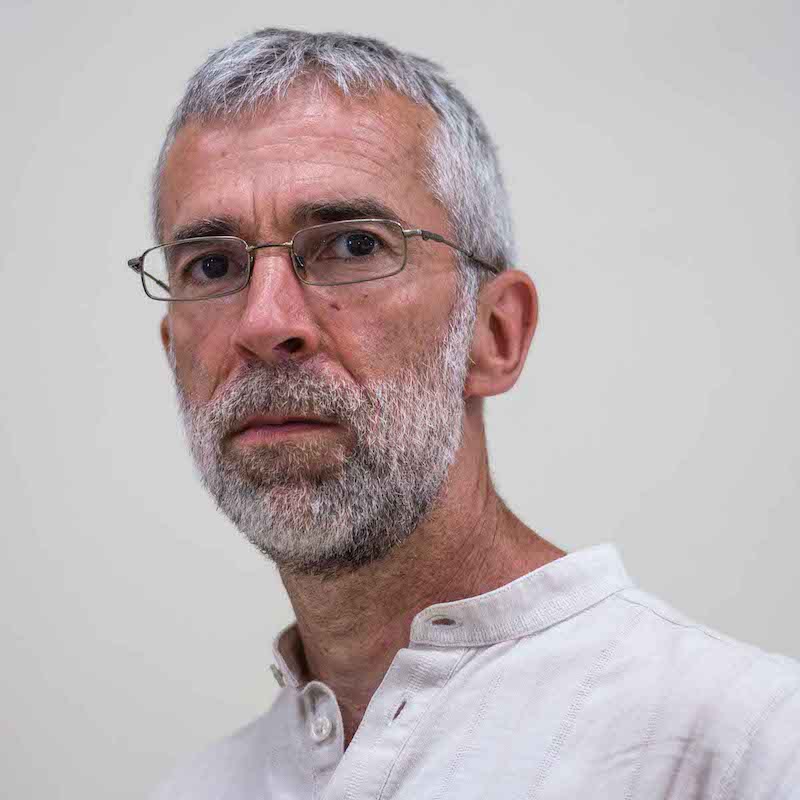
Vincent Roca @ Inria
News...
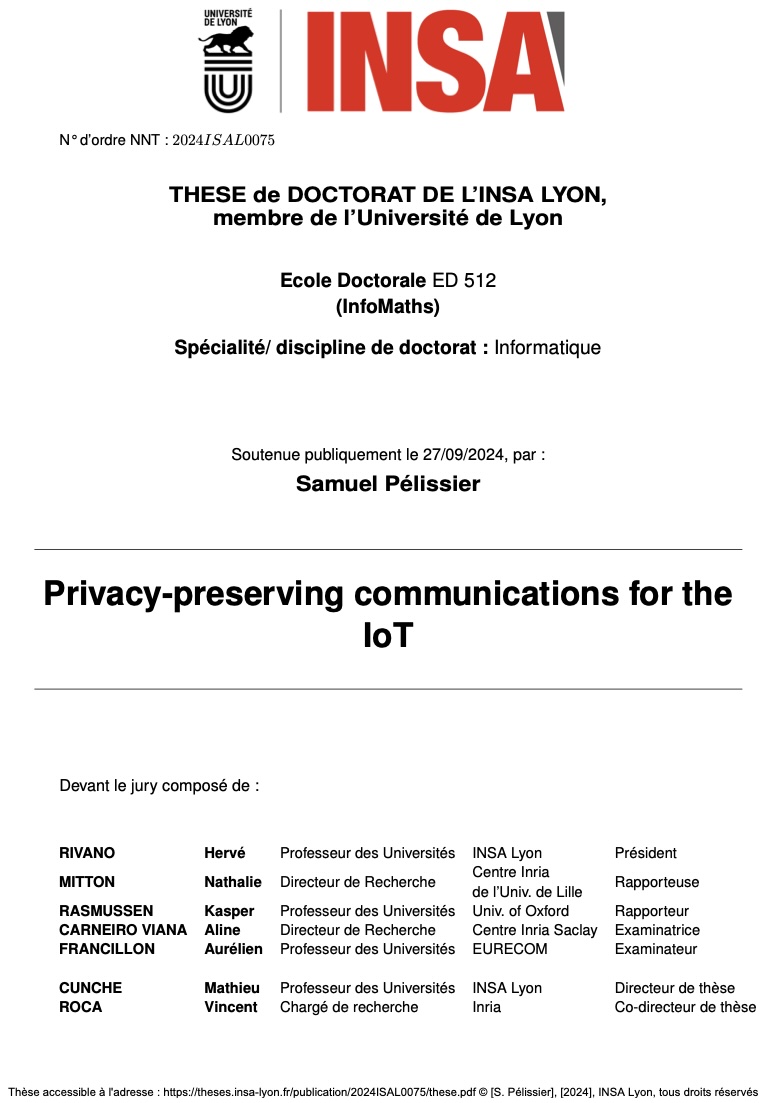
On September 2024, Samuel Pelissier defended his PhD entitled: "Privacy preserving communications for the IoT: the case of LoRaWAN", co-supervised with Mathieu Cunche. His thesis is brillant and provides a ubiquitous tour of the problem of privacy risks in the LoRaWAN wireless technology, with actionnable improvements. Samuel, I am happy to have spent three years with you, really, and your brand new title of Doctor from the INSA Lyon is more than deserved.
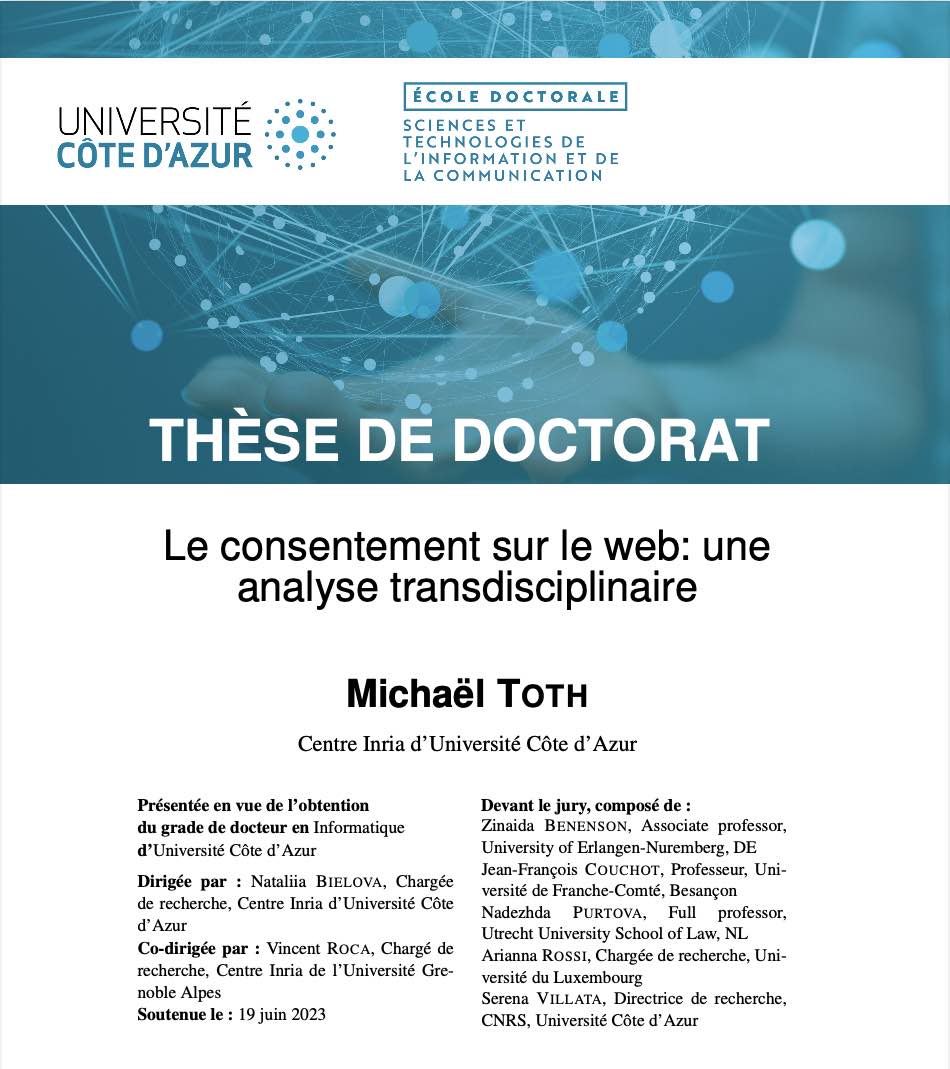
On June 19th, 2023, Michael brillantly defended his PhD entitled: "Dark Patterns and GDPR Compliance of Consent Pop-ups" and obtained the title of Doctor from the Université Cote d'Azur.
Thoughout this work, he contributed to the topics of dark patterns commonly found in the consent banners of website for instance, and to the problems of collecting user consent and manipulating users and clients of online services.
Felicitation Michael, I enjoyed supervising your work with Nataliia along these three years.
Learn more in Michael's web page.
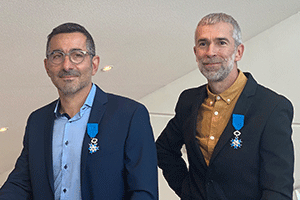
Since March 2020, with my PRIVATICS colleagues, we designed from scratch the ROBERT Contact Tracing protocol first, and later the CLEA Presence Tracing protocols, both of which are embedded in our French national TousAntiCovid app. These protocols laid the foundations of our sovereign app (i.e., we do not depend on the Google/Apple GAEN system at all). Over the time, many features have been added to this app (e.g., stats, news, advices, attestations, sanitarian pass), which became one of the key tools of the French Health Authority, regularly used by more than 1/3 of the population.
Six people received Knight medal of the French Order of Merit distinction, I am one of them (in the picture with my colleague Claude Castelluccia), a seven'th one was awarded Knight of the Legion of Honour.
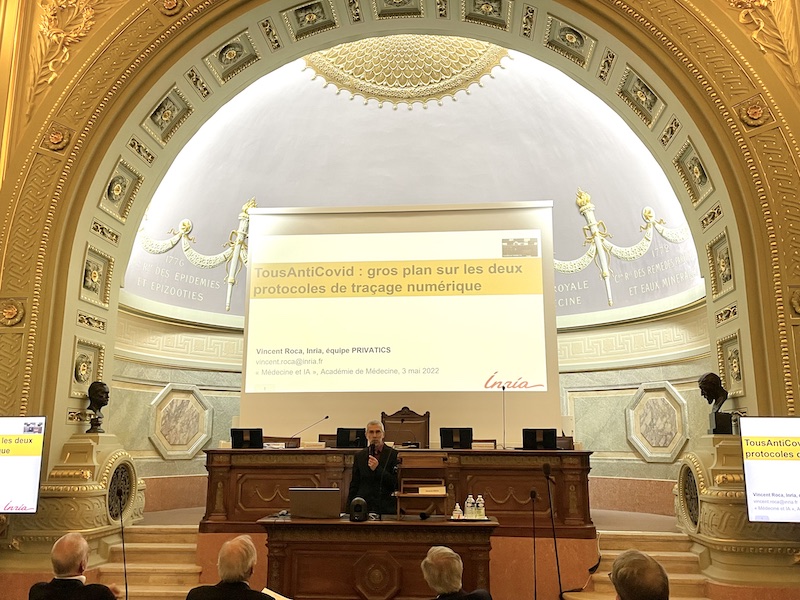
The CLEA presence tracing protocol aims to notify users about their presence in a potential cluster event, typically while at a bar, restaurant, or even a private party. It is fully automatic and privacy preserving. It has been added to the French TousAntiCovid app and is deployed since June 2021.
For more information:
- V. Roca, A. Boutet, C. Castelluccia, "The Cluster Exposure Verification (CLEA) Protocol: Specifications of Protocol", June 2021.
(CLEA protocol v0 specifications) (Gitlab repository for source code, specifications, documents)
Picture: Vincent presenting TousAntiCovid during the "Médecine et intelligence artificielle" seminar at the French Acaddémie de Médecine, April 2022.
Copyright (c) 2022 - Académie de Médecine
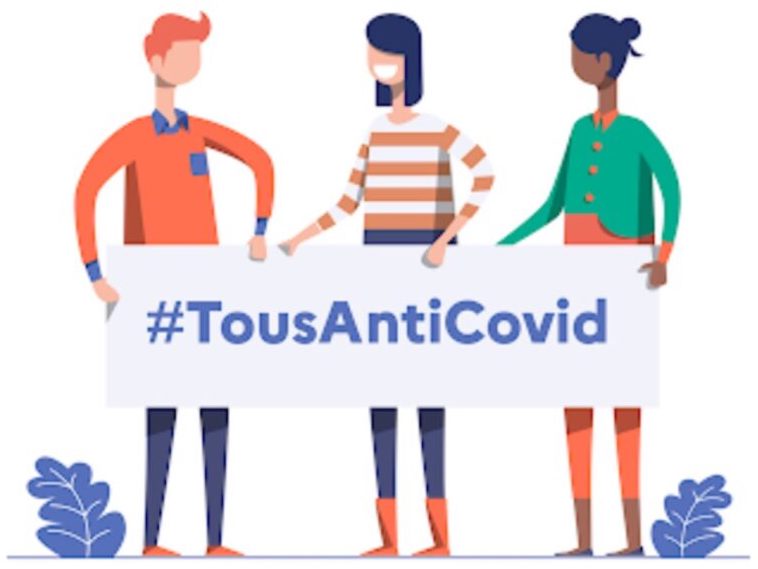
The PRIVATICS team has designed the CNIL approved privacy preserving exposure notification protocol, ROBERT, behind the French StopCovid national app.
The PRIVATICS team has also designed the DESIRE protocol, that offers many benefits to ROBERT. Discover why this is a major step forward compared to Google and Apple Exposure Notification (GAEN) system in the talk I've given during the ViSP workshop (ref. below), and in our new website: https://privatics.inrialpes.fr/desire/.
For more information:
- ``From ROBERT to DESIRE exposure notification: situation and lessons learned'', Invited talk during the Workshop on Security and Privacy in Contact Tracing, ViSP, Vienna Cybersecurity and Privacy Research Center, September 2020. (youtube record), https://hal.inria.fr/hal-02936838/en/ (slides, PDF).
- From ROBERT to DESIRE exposure notification web site, https://privatics.inrialpes.fr/desire/.
I have been appointed leader of the PRIVATICS Inria research team, starting on November 2019. This is a great honnor and a true challenge to be named as successor to Claude Castelluccia. Thanks a lot, everybody, for your trust.
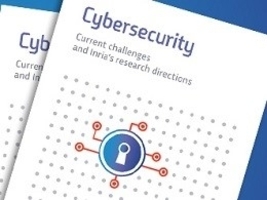
With Steve Kremer, Ludovic Mé, and Didier Remy, we, authors, coordinated the writing of Inria's white book on cybersecurity, issued on January 2019.
It provides a survey of academic research in cybersecurity and privacy, covering most of the sub-domains, and illustrating it with a map of Inria research teams in the domain (yes, it's an Inria document).
If your're looking for an overview of research in this huge domain, if you're looking for partners or experts, or if you're just curious to know what's going on in the academic world, do not hesitate, you'll probably find interesting pointers in this book.
And we wrote it in order to enable multiple levels of reading.
For more information:
Inria news: "Les bilans et défis scientifiques en cybersécurité (FR)"
Link to the book: "Cybersecurity: current challenges and Inria's research directions" (EN)

After the great success of the session 1 of our MOOC on "Privacy in the digital world" (14,006 registered participants,
which is the highest score all Inria MOOC considered, and a very active forum), here is the time for session 2...
A participant said earlier this year: "Ce cours devrait etre déclaré d'utilité publique, diffusé
dans toutes les écoles, voire fourni avec chaque smartphone et ordinateur."
For more information:
MOOC presentation (French)
Vidéo de présentation (French)
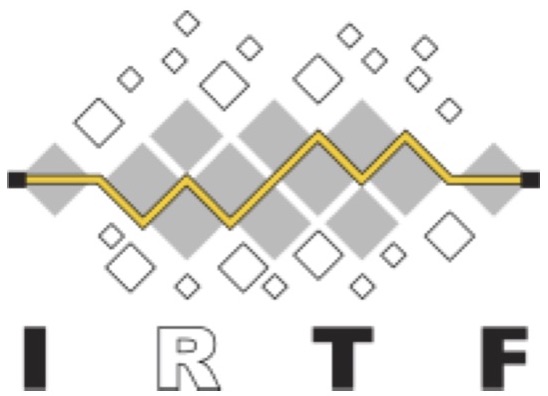
Along with Marie-Jose Montpetit, we have re-launched the "Coding for Efficient Network Communications" NWCRG research group of IRTF.
The goal is to research FEC and Network Coding principles and methods that can benefit Internet communication, in strong relationship with IETF.
For more information:
the datatracker contains official information, meeting minutes, and all documents.
our GitHub repositories contain the most up-to-date content related to our research group activities.
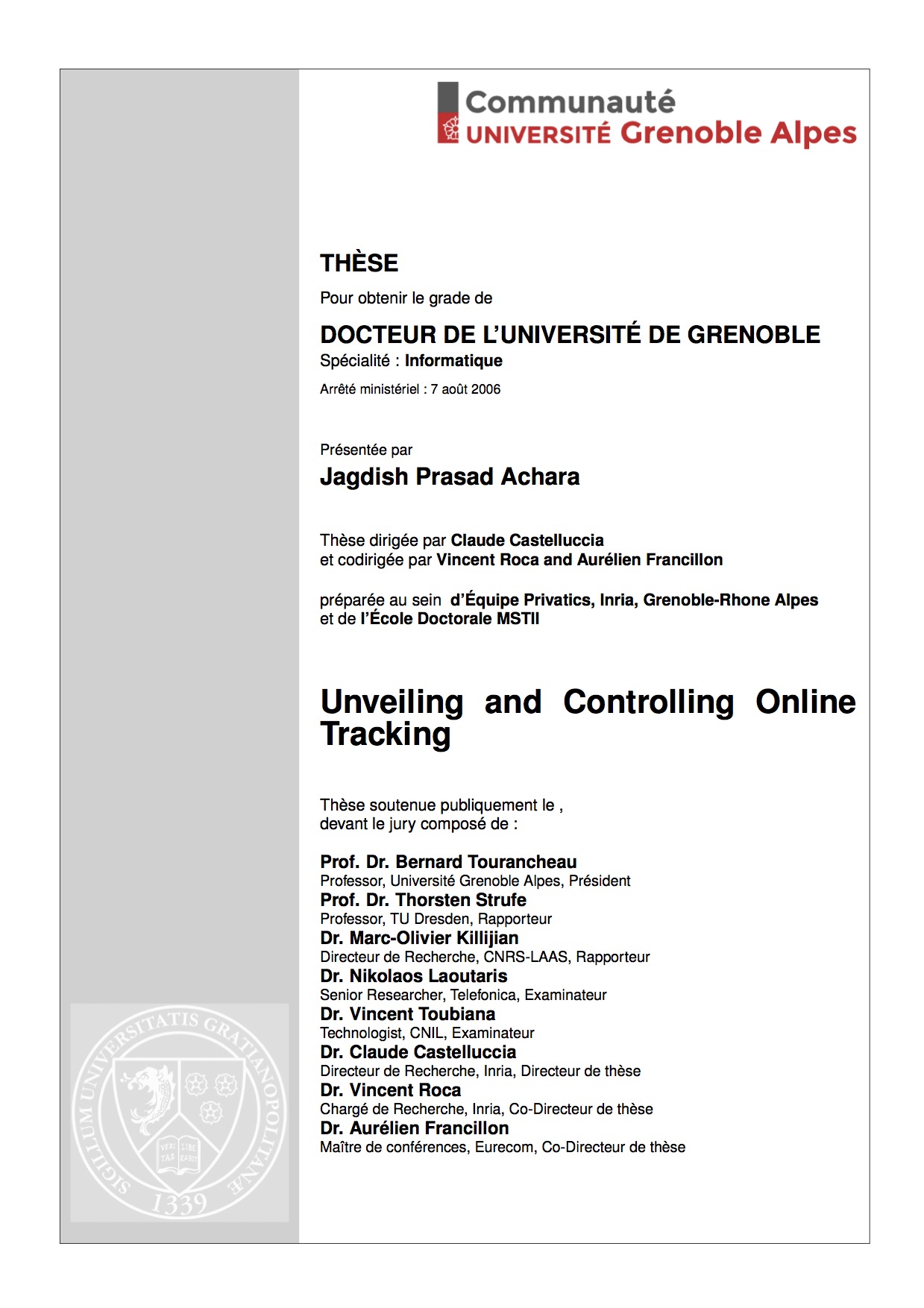 FTC Inmobi settlement
FTC Inmobi settlement
In 2014 we identified Inmobi as a company abusing the Android very permissive ACCESS_WIFI_STATE in order to geolocalize users without their knowledge nor permission. June 2016's FTC settlement against Inmobi confirmed our discovery. Yes, our work in Mobilitics/CAPPRIS triggered this settlement.
Last but not least, soon after this settlement, Google finally decided to protect this feature with a geolocation explicit permission... whereas they were aware of this possibility since the beginning.
Learn more about this and other tools that help build a better Internet in Jagdish Achara's PhD thesis (in English) that I co-supervised.
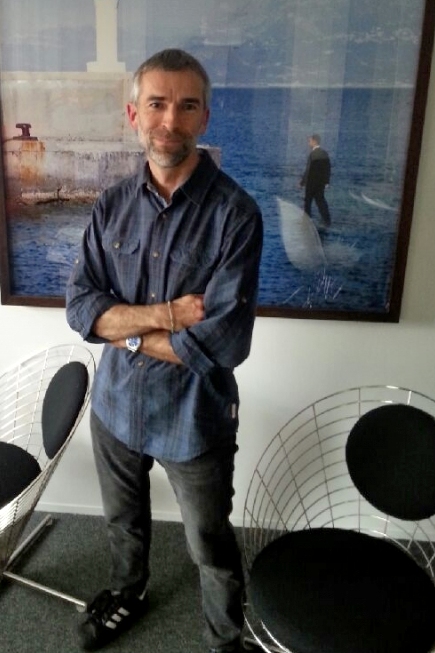
New communication on the output of the Mobilitics project: I gave an interview in the radio program "Les Nouvelles Vagues" from Marie Richeux, France Culture. With Interstice, we also published a podcast on the same topic one month before.
For more information and access to the full record of the interview:
France Culture podcast (59', in French)
Interstice podcast (13', in French)
On the recent invalidation by the European Court of Justice of the "Safe Harbor" program that used to enabled several US companies to collect our personal data: Invalidation du "Safe Harbor" par la Cour de Justice de l'Union européenne : une décision clé pour la protection des données (in French)
Picture is (c) Copyright 2015 France Culture
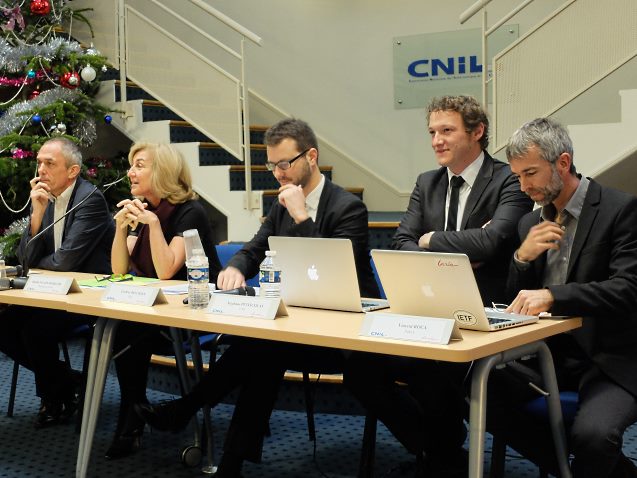
On December 15th, a joint Inria - CNIL (the French data protection agency) press conference was held at CNIL premises to introduce the latest results of the Mobilitics project that focuses on privacy and smartphones. This press conference, focusing on Android, follows that of April 2013 that was limited to iOS.
For more information:
Mobilitics, saison 2 : nouvelle plongée dans l'univers des smartphones et de leurs applications" (in French)
Lettre IP8 : Mobilitics, saison 2 : Les smartphones et leurs apps sous le microscope de la CNIL et d'Inria (in French)
Wifileaks: Underestimated Privacy Implications of the ACCESS_WIFI_STATE Android Permission (in English)
Picture is (c) Copyright 2014 01Business
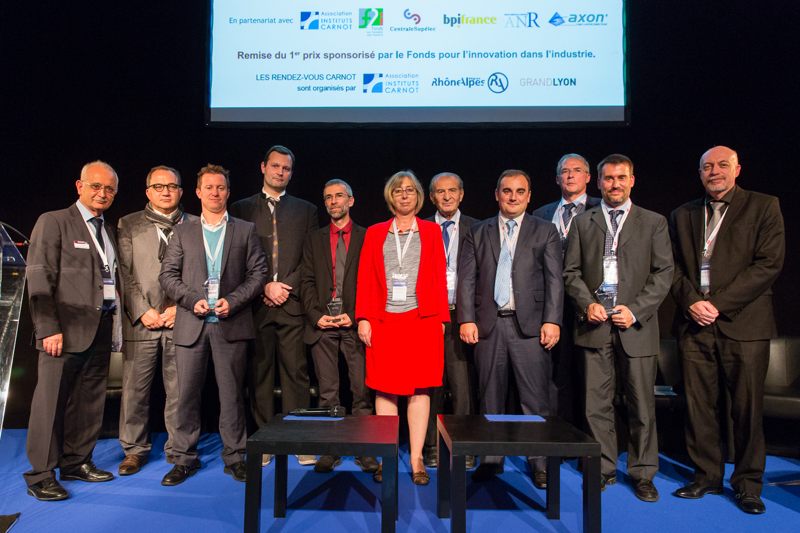
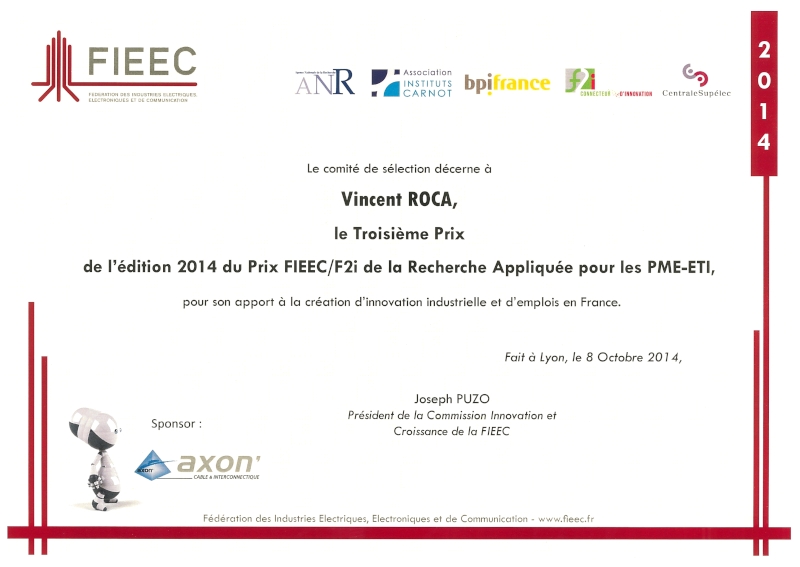
I have been awarded the Third Applied Research price of the FIEEC (Fédération des Industries Electriques, Electroniques et Communication" on October 8th, 2014, for my transfer activities to the Expway French SME.
For more information, see the FIEEC page.
Right picture is (c) Copyright 2014, FIEEC, credits: L. Benevello
My Habilitation à Diriger des Recherches (HDR) public defense took place on Thursday June 19th, 2014, in the Inria Rhône-Alpes premises, Montbonnot.
``Codes AL-FEC et protocoles de diffusion robuste de contenus : composants pour des services performants et passant à l'échelle''
``AL-FEC codes and robust content distribution protocols: components for high performance and scalable services''
http://hal.inria.fr/tel-00925955/en/ (in French)
Committee:
- Ernst Biersack, PR Eurecom (reviewer)
- Bernard Cousin, PR Rennes-1 (reviewer)
- Marie-José Montpetit, Main Lecturer, MIT (reviewer)
- Claude Castelluccia, DR Inria (examiner)
- Walid Dabbous, DR Inria (examiner)
- Pierre Duhamel, DR CNRS (examiner)
- Jérome Lacan, PR ISAE (examiner)
- Kavé Salamatian, PR Savoie (examiner)
Résumé:
Ce document discute de la fourniture de services de diffusion où des contenus de toute nature doivent être transmis
efficacement à un ensemble de récepteurs. Plusieurs problèmes se posent :
|
Summary:
This work focuses on the provision of broadcast services where contents of any kinds must be transmitted in an efficient manner
to a set of receivers. Several problems arise:
|
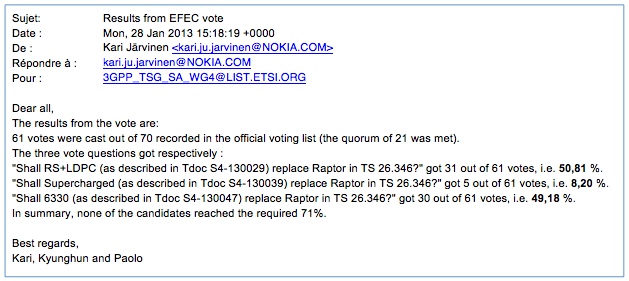
Above is a copy of the email announcing the final vote results (NB: "6330" refers to the IETF RFC6330 specifying RaptorQ(tm) codes from Qualcom, Inc. and "Supercharged" refers to the Supercharged codes proposed by Broadcom). With (Expway) and our colleagues from ISAE, we proposed to use Reed-Solomon (RFC5510) + LDPC-Staircase (RFC5170) codes as a replacement to the old Raptor(tm) codes. The competition lasted more than one year. As explained in the above email, the difference is not sufficient for our proposal to be included in the future 3GPP eMBMS standard. However this remains a great achievement and in any case it was proven that our Reed-Solomon + LDPC-Staircase proposal performs better than the old Raptor(tm) codes of the previous 3GPP standards, for all the use-cases considered and representative of the use of AL-FEC codes in 3GPP MBMS technologies.
For more information see:
- V. Roca, M. Cunche, C. Thienot, J. Detchart, J. Lacan, ``RS + LDPC-Staircase Codes for the Erasure Channel: Standards, Usage and Performance'', IEEE 9th International Conference on Wireless and Mobile Computing, Networking and Communications (WiMob 2013), October 2013. http://hal.inria.fr/hal-00850118/en/
- Expway news after the final vote, February 2013.